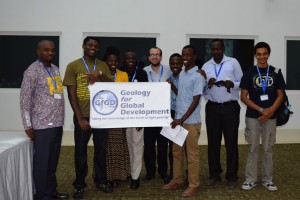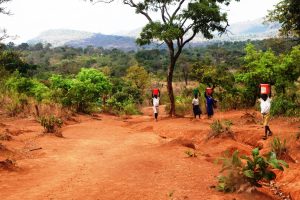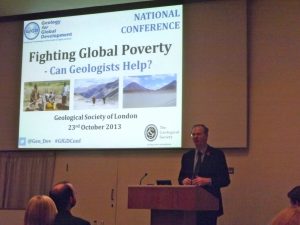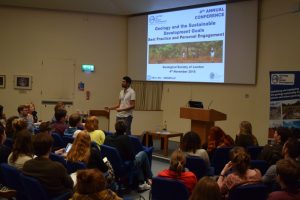
Cultural Communication Workshop in Tanzania at the YES Network Congress (August 2014).
Geology for Global Development (GfGD) is a registered charity in England and Wales (Charity Number: 1165663). As we prepare to launch our 5-year strategy (2017-2021) on Monday 12th June, we believe it is helpful to reflect on our story to-date, and share some highlights.
Tanzania: The start of our story
Kagera is a beautiful region of Tanzania, bordering Uganda, Rwanda, Burundi and Lake Victoria. It is one of the poorest regions of Tanzania, with challenges including health (HIV/AIDS, malaria, diarrhoea), education, income generation, food security, and access to clean water and safe sanitation. Statistics from the World Bank data centre (2015) suggest that in the rural population (much of Kagera), only 46% of people have access to clean, safe water. In the midst of these challenges can be found the people of Kagera, characterised by their hospitality, warm welcome and eagerness to share and learn.

Water collection in Kagera (Tanzania). (Credit: Joel Gill)
Kagera is also the region where GfGD was birthed. I visited in 2009 to help evaluate a water programme, and again in 2010 to advise on the recommendations made in that research. During these visits I observed water projects that had failed due to a lack of understanding of geoscience, but many more projects that had failed due a lack of understanding of good development practice by the engineers, geoscientists and other technical partners involved. Water projects were placed in locations without consultation with communities, and maintenance skills training was absent. One afternoon, sat in the Kagera sunshine, I was reflecting on these observations and decided that I would start something connecting geology and international development.
The early days of Geology for Global Development
In February 2011, I launched a blog, writing and publishing articles on geology and international development. Simultaneously, I began a consultation process, exploring what existing organisations were doing and what could be done to help improve the engagement of geologists with international development. Geology for Global Development (GfGD) was then launched with a formal website in June 2011, aiming to mobilise and equip the geology community to prevent and relieve poverty. Recognising the need to focus our resources, we primarily engaged with students and early-career geologists, although we were aware of the relevance of our work to the broad geoscience community. Through our activities we help to provide young geologists with the skills, information and opportunities they need to make a long-term, effective and sustainable contribution to international development.

Our 1st Annual Conference, opened by Jeremy Lefroy MP
Since 2011, a team of volunteers have worked hard to build the reputation of Geology for Global Development as an organisation with national and international influence on matters relating to geology and international development.
Examples of our work include:
- Delivering a series of successful conferences in London, workshops in Tanzania and South Africa, and seminars at multiple major international conferences.
- Establishing a growing University Group network in the UK.
- Running diverse practical initiatives to support international development, including a hazards education programme in the United Kingdom.
You can read more about our most recent activities in 2016, in this Annual Report.
Building Partnerships
We value working in partnership with other organisations. We have greatly benefited from the experience, expertise and resources made available to us from our colleagues and friends at the Geological Society of London. They have hosted, subsidised, and advised on each of our Annual Conferences (2013–2017). We have also partnered with the European Geosciences Union since October 2012, as a member of their blog network. Their commitment to facilitating science communication has enabled us to have a free and appealing portal to communicate our work. In 2017 we signed a Memorandum of Agreement with the International Association for Promoting Geoethics (IAPG).
Engaging with the UN Sustainable Development Goals
In 2015, we started a process of engagement with the UN Sustainable Development Goals (SDGs). The SDGs provide the geology community with an exciting opportunity to apply our science to help solve some of the world’s most important development challenges and maximise development opportunities. Access to clean water and clean affordable energy, food security, sustainable urban areas, climate action, economic growth, and resilient infrastructure all depend on an understanding of geological processes and materials.

4th GfGD Annual Conference (2016)
In 2015, we organised the first major gathering of geologists anywhere in the world to explore the role of geology in the SDGs, with our annual conference in 2016 continuing this theme. Our pioneering leadership on geology and the SDGs has been recognised internationally, with a leading US university capturing this in their description of our 2015 conference as one ‘of and for the future’. We have since organised related workshops at events in Europe and Africa, and published the first detailed examination of Geology and the SDGs in the International Union of Geological Sciences’ journal Episodes.
The SDGs remain a power articulation of the world we wish to build. We have embraced their aims, and will be making clear reference to the SDGs in our new strategy and work going forwards.
Formal Charity Registration
As part of our commitment to professionalism and excellence, in 2015 we began the process of registering with the Charity Commission for England and Wales, and establishing a Board of Trustees. This facilitates the growth of Geology for Global Development, expanding and enhancing our work. In February 2016, we received the news that our application had been successful and Geology for Global Development was to become an official registered charity (Charity Number: 1165663). Our work continues to be supervised by a Board of Trustees, with day-to-day work coordinated by an unpaid executive team.
New Strategy: Looking to the future
On Monday 12th June we will launch our 5-year strategy (2017-21), to outline our purpose, vision, and objectives. This strategy will guide our activities over the next five years, with future Annual Reports giving feedback on progress towards these strategic objectives. To help deliver this strategy, we’ll be seeking new funding, new volunteers and new members of the executive team and board of trustees.
We’ll be starting new initiatives, and continuing our most popular events such as the annual conference. We have already announced that our 5th Annual Conference (3 November 2017), hosted and supported by the Geological Society of London, will examine the theme ‘Cities: Opportunities and Challenges for Sustainable Development’. Registration will open in the summer of 2017, with further details to be posted on our website and social media.
In the years to come we hope to build on our success. I am excited about our new strategy and the focus it will bring to our work. I hope it will also inspire and excite you, and you will join us in our vision to mobilise the geoscience community to better serve the people of Kagera and beyond.
